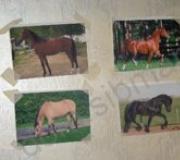Plan for a short story in French lessons. Analysis of “French Lessons” Rasputin
Retelling plan
1. The boy leaves his native village for the regional center to continue his education.
2. The hero’s difficult life in the city.
3. Fedka, the owner’s son, introduces him to the guys who play for money.
4. The boy learns to play chica, starts winning and buys milk with the money he wins.
5. The hero is beaten by guys who play dishonestly.
6. Tishkin tells the teacher that the boy is playing for money.
7. Lidia Mikhailovna begins to study French with him individually.
8. The boy receives a parcel of pasta.
9. The hero of the story is making progress in French.
10. Lidia Mikhailovna teaches him to play “measuring”.
11. The boy again wins money with which he buys milk.
12. The school principal finds out about the game.
13. Lydia Mikhailovna is leaving. Parcel with pasta and apples.
Retelling
In the hungry post-war years, the hero comes from the village to the regional center to continue his studies. He enters the fifth grade, lives with friends of his mother, suffers from malnutrition, loneliness and homesickness. In order to somehow feed himself, the hero begins to play “chika” with local boys and quickly realizes that this game is dishonest. But he has no choice, he plays honestly and wins every time only a ruble - for milk. They do not forgive him fair play: the hero is meanly and brutally beaten.
At school you have to explain the consequences of a fight - a broken face. The hero does not tell the truth, but he also lies ineptly - this reflects his natural honesty. The boy is threatened with expulsion from school, and he is afraid not so much of punishment as of shame, afraid of appearing to be an unreliable person. His teacher helps him out: she realized that the boy was simply starving, and decided to help him. She began by teaching him additional French.
The author uses the technique of antithesis (contrast). An intelligent, beautiful, well-dressed woman, who is not spoiled even by slightly squinting eyes, “was not a teacher of some kind of arithmetic or history, but of the mysterious French language, from which also came something special, fabulous, beyond the control of anyone.” Who does she see in front of her? “In front of her, crouched on the desk was a skinny, wild boy with a broken face, unkempt, without a mother and alone, in an old, washed-out jacket on his drooping shoulders, which fit on his chest, but from which his arms protruded far, in breeches altered from his father’s.” Yes, the student and the teacher are not alike, but they have something that unites them. Lidia Mikhailovna says: “Sometimes it’s useful to forget that you are a teacher, otherwise you will become such a jerk and beech that living people will become bored with you. For a teacher, perhaps the most important thing is not to take himself seriously, to understand that he can teach very little.”
It quickly became clear to Lydia Mikhailovna that the student would not accept direct help, and then she herself decided to play with him for money - “measures,” quietly playing along, giving in. Thanks to the “honestly won” money, he could buy milk again. In addition, the teacher aroused the boy's interest in French - he began to make significant progress.
One day, Lidia Mikhailovna and the boy were caught playing “measures” by the school principal. It was useless to explain anything to him. Three days later, Lidia Mikhailovna left the regional center and sent the boy a package for New Year: pasta and apples. He realized that he was not alone, that there were kind, sympathetic people in the world.
Outline of the story "French Lessons"
- achnrvepol
4.mysterious package
5. luck in the chica game
6.quarrel with friends
7.visiting Lydia Mikhailovna
11.departure of Lydia Mikhailovna- 1.Village
2.City
3. Fight
4. Repeated beating
5.French lessons
6. Game of "Measuring"
7. Departure of Lydia Mikhailovna - simple plan:
1.difficult time after the war
2. mother’s decision to give her son an education
3.first time of independent living
4.mysterious package
5. luck in the chica game
6.quarrel with friends
7.visiting Lydia Mikhailovna
8. Lidia Mikhailovna’s care for the boy
9.game of measuring with Lidia Mikhailovna
10.sudden appearance of director
11.departure of Lydia Mikhailovna
12. another parcel from Lydia Mikhailovna - azazzaazazaz
- Thank you
- Holy shit O.o
- boring and without details
- 1. Rasputin arrives at school.
2. Because of hunger, he begins to gamble for money.
3. A fight broke out.
4. The French teacher sends food to the boy and forces him to study extra French at home.
5. Lidia Mikhailovna’s game begins.
6. The director finds the teacher and the boy playing together and fires Lydia Mikhailovna.
7. The teacher left. - simple plan
1. The boy's loneliness.
2. Fight.
3. Beaten again.
5. Game of "measuring".
6. Lydia Mikhailovna left.Quotation plan
4. I went there as if it were torture. - Plan
Introduction. Autobiographical nature of the story.
Main part
1.Appearance
A. Description
b. Cloth
V. Health
2.Characteristics
A. Proud - example from text b. Smart - example from the text
V. Attentive - example from the text
d. Steadfast in spirit - example from the text
3. Feelings and Sensations
A. Dot around the house
b. Loneliness
A. Thanks to Lidia Mikhailovna
Conclusion
What is the main lesson the hero of the story learned?
Quotation plan
1. "I went to fifth grade in '48."
2. “But as soon as I was left alone, it immediately began to pile on.”
3."Started playing Chika."
4. "I was beaten."
5. "Lydia Mikhailovna's conversation with me."
6. "Additional lessons with a French teacher at her home."
7. "She showed me how to play Pristenok."
8. "Farewell to the teacher and a parcel of apples."
- simple plan
1. The boy's loneliness.
2. Fight.
3. Beaten again.
4. French classes.
5. Game of "measuring".
6. Lydia Mikhailovna left.Quotation plan
1. But as soon as I was left alone, melancholy immediately fell upon me.
2. On that day there was not and could not be in the whole wide world a person more unhappy than me.
3. But what drove me most was hunger. I needed a ruble not for milk, but for bread.
4. I went there as if it were torture.
5. Well, let's play for real, Lidia Mikhailovna, if you want.
6. Previously, I had only seen apples in pictures, but I guessed that this was them.You will get a good mark for accurate citations.
- thanks everyone!
- not that
- 1. The boy's loneliness.
2. Fight.
3. Beaten again.
4. French classes.
5. Game of "measuring".
6. Lydia Mikhailovna left. - My pleasure
- 1. The boy's loneliness.
2. Fight.
3. Beaten again.
4. French classes.
5. Game of "measuring".
6. Lydia Mikhailovna left.
Analysis of the work
Valentin Rasputin became known to a wide circle of readers as a “village” writer. He is primarily interested not in the innovations of our life, but in the ancient, primordially Russian, deep things that are leaving our lives.
But besides this, he also depicted the hardships that fell on the shoulders of the peasants, which could not but affect the destinies of children. In the story “French Lessons,” Rasputin describes the difficult, half-starved life of a village boy. His mother tries her best to educate him. At the age of eleven, his independent life begins. And although he studies very well, hunger remains his constant companion. He lost so much weight that even his mother was afraid of him. He understands perfectly well that it is not easy for her, so he hides the hardships of his life from her and tries not to upset her with complaints. He knows perfectly well the value of money, the price of each mother's parcel. Such a small person, not yet psychologically strong, nevertheless has a tough inner core that does not allow him to break under the blows of fate. He proudly and steadfastly endures hunger and rejects the help of teacher Lydia Mikhailovna. He also endures humiliation from chiku players. This game one day becomes his only hope for survival. But the cruelty of his peers forces him to leave the field of play.
Lidia Mikhailovna helps him out. French lessons are moved from school to her home. And here the teacher herself invites the boy to play. She understands perfectly well that the little proud man will never accept her gifts. Therefore, she gives him the opportunity to earn them honestly, to win. It is with this thought that he calms himself down, taking the money. Young, but already wise and shrewd, she first plays along with the boy, and then, realizing how this offends him, she begins to cheat right before his eyes. This convinces him that the money he earned is honest. “I immediately completely forgot that just yesterday Lydia Mikhailovna tried to play along with me, and I only made sure that she did not deceive me. Well well! Lidia Mikhailovna, it’s called.”
Thus, French lessons will become lessons of kindness and generosity, although not appreciated or understood. The ending of the work is sad. Lidia Mikhailovna is fired and leaves for her homeland. But even there she does not forget about her student, sends him a parcel with pasta, and at the bottom there are, as the boy guesses, three apples. Sadness creeps into the final lines: the boy had seen them before only in the picture.
Rasputin thinks about the fate of children who have taken on their fragile shoulders the heavy burden of the era of coups, wars and revolutions. But, nevertheless, there is kindness in the world that can overcome all difficulties. Belief in the bright ideal of kindness is a characteristic feature of Rasputin’s works.
Plan
1. A village boy comes to school. He studies well.
2. Due to his poor existence and constant hunger, he begins to gamble for money. He is beaten for his luck in the game.
3. Teacher Lidia Mikhailovna forces him to study French additionally.
4. At her house they start playing for money. The boy again has money for food.
1. Organizational moment.
Warm-up game “Gift”.
2 . Homework survey.
Students had to write the text of a job advertisement.
Working in pairs
Peer assessment.
“Two stars, one wish” strategy.
3. Setting the topic and goals of the lesson.
Working with an epigraph.
“I wrote this story in the hope that the lessons given to me at one time will fall on the soul of both a small and an adult.” V. Rasputin
Conversation
Valentin Grigorievich Rasputin was born in 1937 in a small village near Angara. He graduated from Irkutsk State University and then began working as a journalist. Fame comes to the writer after the publication of his story “Money for Maria.” Then the stories “The Deadline”, “Live and Remember”, “Farewell to Matera”, “Fire” were written, each of which became a significant phenomenon in the literature of our days.
Speech by a trained student
Here is what the writer himself writes: “...It seems to me that a person’s profession can be recognized by his face. By some very tired, stern, almost hopeless look, I often guessed the teachers. I guessed and thought that work drains teachers, that it is very difficult for a teacher to maintain a lively interest in children, spiritual gentleness and warmth. I dedicated the story, the heroine of which was Lydia Mikhailovna, to another teacher - Anastasia Prokofievna Kopylova. When I recognized her, she had already worked at the school for many years, but neither then nor later did I see in her eyes that harsh expression for which it seemed the time had already come.
Conversation
The story “French Lessons” was first published in 1973 in the Irkutsk Komsomol newspaper “Soviet Youth”, in an issue dedicated to the memory of Alexander Vampilov. Anastasia Prokofyevna is his mother. Looking into the face of this amazing woman, who did not age, kind and wise, more than once I remembered my teacher and knew that the children had a good time with both of them.”*
- What does the title of the story say?(About school, about lessons, peers.)
- From whose perspective is the story told? Why?
The story describes the difficult post-war period: the food rationing system, famine, government loans obligatory for the population, the hardships of collective farm labor; The scene of action is Siberia, the writer’s homeland, a remote Siberian village in which there are not even gardens, since the trees freeze out in winter.
- What facts and details paint us an image of the difficult post-war time?
- At what age did the hero begin to live independently?
- What trials awaited him?(Not only constant hunger, suffering from loneliness, separation from home, from mother, but also an acute feeling of injustice, the bitterness of deception. Life teaches the hero cruel lessons. And puts him before the need to choose: remain silent, reconcile - or upset his mother. Bitter thoughts about mother and his responsibility to her force the hero to grow up early.)
- Why does the boy start playing for money? Why do adults condemn this?
- Pay attention to the description of nature at the moment when the boy first won.(Nature seems to correspond to the hero’s mood: it conveys his joy and pleasure, and at the same time the author, with individual strokes, alerts the reader, as if warning him that something is about to happen (read “Autumn was warm and dry...”).
Differentiation by ability
Why Valentine Grigorievich Rasputin called his story “French Lessons?”
"Scaffolding"
"Information" (printed sheet with the answer on the table).
Vocabulary work
The lesson is:
1) a teaching hour devoted to a separate subject;
2) something instructive, something from which one can draw a conclusion for the future. (dictionary by S.I. Ozhegov)
What recognition does the work open with?
What can we guess from this confession?
Theoretical moment
STORY
Masculine
1 .
Verbal presentation of some kind. events.
"R. Eyewitness"
2 .An artistic narrative prose work of small size.
AND
Vocabulary work
One of the features of the story’s language is the presence of regional words and outdated vocabulary characteristic of the time the story takes place. For example:
Lodge
- rent an apartment.One and a half truck
- a truck with a lifting capacity of 1.5 tons.Teahouse
- a type of public canteen where visitors are offered tea and snacks.Toss
- sip.Naked boiling water
- pure, without impurities.Blather
- chat, talk.Bale
- hit lightly.Hlyuzda
- rogue, deceiver, cheater.Pritaika
- what is hidden.
Vocabulary dictation
French language, regional center, pasta, Kuban, Angara village, Siberia.
Self-assessment based on the model.
Group work
Distribution into groups
Listening to a movie fragment “French Lessons” (45.11-45.46)
Assignment: create two high-order questions.
Answers-questions.
Commenting.
Peer assessment.
Questions and assignments on the work being studied based on Bloom's taxonomy:
1 group
What actions of the hero (heroes) did you not like? Why?
WITH What problem does one of the characters face and how does he solve it?
Plist names and describe
characters from V. Rasputin’s story “French Lessons”.
2nd group
P Think about how you could change the end of the story “French Lessons.” Explain why?
Suppose this story from the story “French Lessons” happened a long time ago. Compare then and now. If this story happened in our time, compare it with the past. What would be the differences?
NFind five similarities between the main character of V. Rasputin’s story “French Lessons” and himself.
What lesson did you learn from the work you read?
3 group
If you could save one character from V. Rasputin’s story “French Lessons” from a difficult situation, who would it be and why?
PCome up with your own short story about the characters in the story “French Lessons.”
Ndraw a poster based on V. Rasputin’s story “French Lessons” (Which part of the story did you like best? Why?).
Evaluation criteria | Descriptors the student has achieved the goal if: | Point |
8.Ch3. Answers questions, gives arguments, connects text information with other facts from real life. | Provides answers to questions; Gives arguments; Connects text information with other facts from real life. | 1 1 1 |
Total: | 3 |
Group performance
Peer assessment
Valentin Rasputin became known to a wide circle of readers as a “village” writer. He is primarily interested not in the innovations of our life, but in the ancient, primordially Russian, deep things that are leaving our lives.
But besides this, he also depicted the hardships that fell on the shoulders of the peasants, which could not but affect the destinies of children. In the story “French Lessons,” Rasputin describes the difficult, half-starved life of a village boy. His mother tries her best to educate him. At the age of eleven, his independent life begins. And although he studies very well, hunger remains his constant companion. He lost so much weight that even his mother was afraid of him. He understands perfectly well that it is not easy for her, so he hides the hardships of his life from her and tries not to upset her with complaints. He knows perfectly well the value of money, the price of each mother's parcel. Such a small person, not yet psychologically strong, nevertheless has a tough inner core that does not allow him to break under the blows of fate. He proudly and steadfastly endures hunger and rejects the help of teacher Lydia Mikhailovna. He also endures humiliation from the chiku players. This game one day becomes his only hope for survival. But the cruelty of his peers forces him to leave the field of play.
Lidia Mikhailovna helps him out. French lessons are transferred from school to her home. And here the teacher herself invites the boy to play. She understands perfectly well that the little proud man will never accept her gifts. Therefore, she gives him the opportunity to earn them honestly, to win. It is with this thought that he calms himself down, taking the money. Young, but already wise and shrewd, she first plays along with the boy, and then, realizing how this offends him, she begins to cheat right before his eyes. This convinces him that the money he earned is honest. “I immediately completely forgot that just yesterday Lydia Mikhailovna tried to play along with me, and I only made sure that she did not deceive me. Well well! Lidia Mikhailovna, it’s called.”
Thus, French lessons will become lessons of kindness and generosity, although not appreciated or understood. The ending of the work is sad. Lidia Mikhailovna is fired and leaves for her homeland. But even there she does not forget about her student, sends him a parcel with pasta, and at the bottom there are, as the boy guesses, three apples. Sadness creeps into the final lines: the boy had seen them before only in the picture. Material from the site
Rasputin thinks about the fate of children who have taken on their fragile shoulders the heavy burden of the era of coups, wars and revolutions. But, nevertheless, there is kindness in the world that can overcome all difficulties. Belief in the bright ideal of kindness is a characteristic feature of Rasputin’s works.
Plan
- A village boy comes to school. He studies well.
- Due to his poor existence and constant hunger, he begins to gamble for money. He is beaten for his luck in the game.
- Teacher Lidia Mikhailovna forces him to study French additionally.
- At her house they start playing for money. The boy again has money for food.
- The director catches them playing one of the games. This ends with the dismissal of Lydia Mikhailovna.




